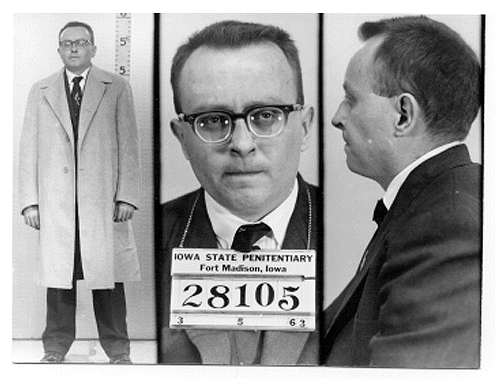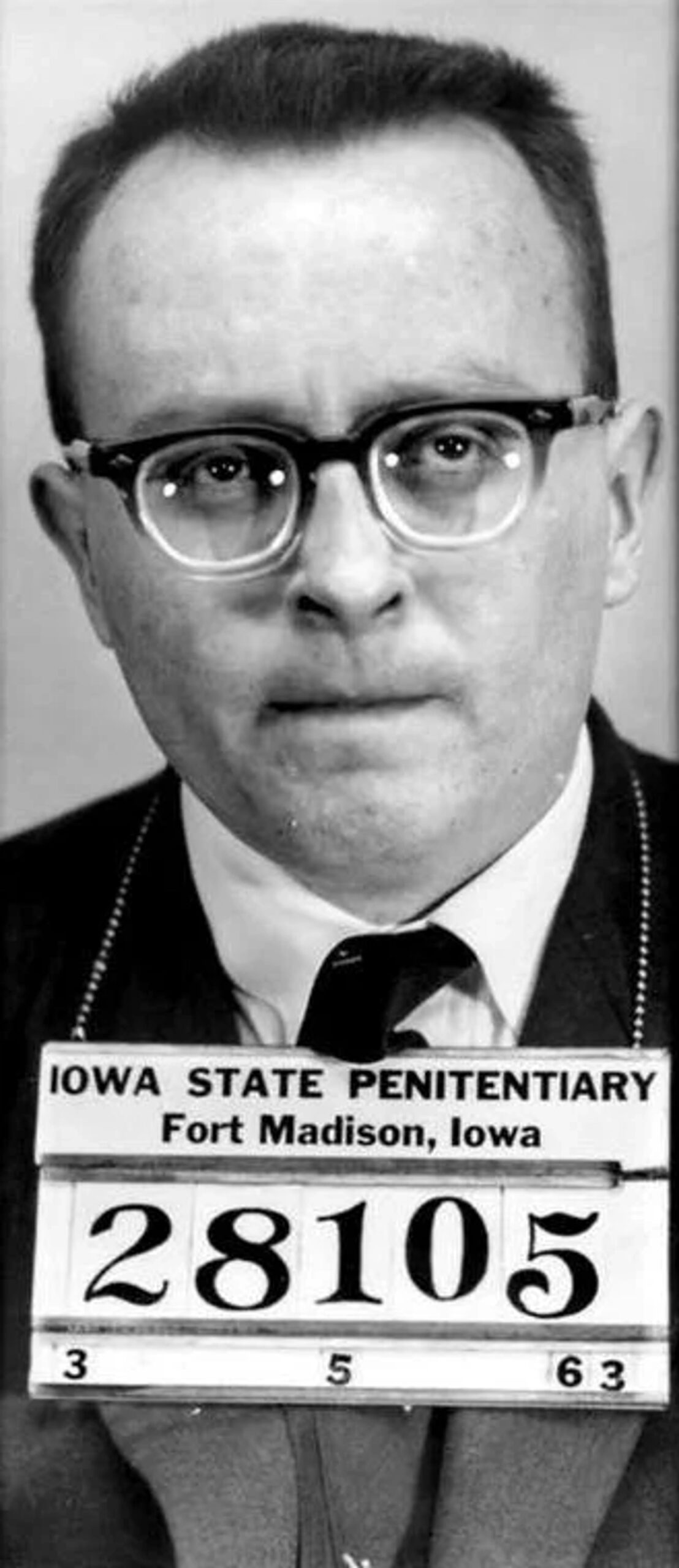Victor Feguer became known not only for the crime that sent him to death row but also for the chilling final meal he requested before his execution. His unusual decision sparked curiosity for decades and left many wondering what message he hoped to send with this quiet and symbolic choice. The details surrounding his final hours and the events that led to them reveal a story that is both factual and haunting, a story that continues to fascinate those who study true crime and human behavior.

The name Victor Feguer is often remembered for one reason: the single olive he chose as his last meal. However, the path that brought him to that moment began long before the request. The facts of the case show the sequence of actions that led to a tragic outcome and eventually a rare federal execution. Many people encountering his story for the first time feel a mix of curiosity and disbelief, not only because of the crime but also because of what he wanted in his final minutes.
In the early sixties, most people in Iowa lived quiet lives without expecting danger to appear at random. Feguer was young at the time, only in his mid-20s, and he lived a life without remarkable records of stability or direction. Instead, the events that followed came from decisions that spiraled into violence, leaving a doctor dead and a community shaken. This background sets the stage for understanding how his last meal came to represent something deeper for him, even if no one around him could fully grasp his intention.
The story begins in July 1960, when Victor Feguer flipped through the Yellow Pages in Iowa and focused on the list of local physicians. Instead of calling for an appointment or a legitimate need, he began dialing numbers in alphabetical order. The calls appeared random, but the intention behind them soon became clear. When the call reached Dr Edward Bartels, the doctor answered without knowing that this moment would lead to a deadly outcome.
During the conversation, Feguer claimed that a woman needed urgent medical care. It sounded believable enough for a devoted physician who was committed to helping people in need. Dr Bartels took the call seriously and traveled to the address he had been given. It seemed like another situation where a doctor responded to a patient in distress. Instead, it marked the beginning of a tragic sequence of events that would end a life and shape another.
When Dr Bartels arrived, no woman was waiting for help. Instead, he encountered Feguer. Born in Michigan and only twenty-five at the time, Feguer had created a false emergency to lure the doctor to an isolated location. What happened next became part of the official record. Dr Bartels was kidnapped and later killed in Illinois. His body was eventually found in a cornfield with a fatal gunshot wound to the head.
The discovery confirmed the worst fears of the local community. People could not understand why a young doctor dedicated to healing had become the target of such violence. The details offered little comfort to those who knew him. The case moved quickly because of its gravity. Federal authorities became involved due to the interstate nature of the kidnapping. Soon, the evidence built a strong case against Feguer.
Even though Victor Feguer insisted that someone else committed the murder, the court did not accept his claims. Witnesses, physical evidence, and the pattern of events contradicted his version. The judge and jury found him guilty, and the conviction resulted in a sentence of death. At the time, federal executions were rare, which meant his case drew additional attention. It was seen as a severe punishment for a severe crime.
Feguer attempted to appeal the decision. He sought a different outcome, arguing that the situation had not unfolded in the way investigators claimed. His legal team supported him and tried to prevent the execution. The court system reviewed the materials but did not find a reason to change the verdict. The ruling remained intact, and the only person left with the authority to change his fate was the President of the United States.
By the early sixties, John F Kennedy had taken office. The responsibility to grant or deny clemency for death row inmates rested with the President. In Feguer’s case, several people attempted to advocate for mercy. Iowa’s governor, Harold Hughes, joined with Feguer’s attorney in asking for clemency. They hoped the President would consider the request, especially since many executions at the federal level had been paused or reconsidered in other cases.
President Kennedy reviewed the case and the details surrounding the kidnapping and murder. Reports from the time indicate that he found the crime incredibly brutal. This impression weighed heavily on his decision. After examining the arguments, Kennedy ultimately refused to grant clemency. His refusal sealed Feguer’s fate. The execution date remained in place, and preparations continued.
The Day of Victor Feguer’s Execution

On March 15, 1963, Victor Feguer faced the final moments of his life. He was twenty-eight years old at the time and had already spent years on death row. The execution method was hanging, which was still permitted in certain federal cases. The process followed strict protocol. Guards and officials oversaw each part, and the environment carried the solemn atmosphere expected in such a situation.
In those final hours, inmates often think about what they want to eat for their last meal. People tend to choose rich food or something comforting. Many select items that remind them of home or childhood warmth. The idea of a final meal often becomes a small moment of control in an otherwise controlled environment. Most inmates choose something familiar or indulgent. Victor Feguer chose something entirely different.
When the time came to request his last meal, Feguer did not ask for anything elaborate. He did not choose steak, desserts, or anything symbolic of comfort. Instead, he requested one single olive with the pit still inside. The request appeared unusual to everyone involved. The simplicity of it made people wonder if he was refusing food altogether or if the request had some hidden meaning.
Guards delivered the olive as requested. There was no drink or side dish. No explanation was given immediately, leaving officials with questions that only he could answer. Out of all the meals available, out of all the food he could choose, why did he want only one olive? The answer came later and added another layer to the already unsettling narrative.
According to reports after his death, Victor Feguer believed that if he was buried with the olive pit, an olive tree would grow from his grave. The tree, he said, would represent peace. It would stand as a symbol of something pure growing from a life that had taken a chaotic and destructive path. The idea of a peaceful symbol rising from a violent situation seemed meaningful to him. Some described it as his final attempt at redemption, a gesture to express remorse or hope for transformation.
This belief is connected to long-standing traditions in some cultures where olive trees symbolize peace, renewal, and the possibility of new beginnings. Regardless of whether this symbolism applied directly to him, the choice suggested he wanted some form of peaceful legacy. Perhaps he hoped people would remember the tree instead of the crime. Perhaps he wished for a sign that peace could emerge from the darkest corners of a human story.
After the execution, some reports claim that the olive pit was found in the pocket of the suit he wore during his final moments. If this detail is accurate, it means the pit never made it to the coffin. Without the pit in the ground, there was no chance for any olive tree to grow. The symbolism remained in thought but not in reality. There is no record of any tree sprouting at his burial site.
In the end, the story of Victor Feguer became a mix of facts, tragedy, and symbolism. The crime took a life and affected many others. The legal process followed its course. The final meal choice left a lasting impression because it carried a message that was quiet and almost poetic in its contrast to the violence of the crime. The single olive became part of his legacy, a detail that continues to fascinate people who read about his case.
Many true crime cases fade from public memory as years pass, but some remain because of unusual details. The story of Victor Feguer still circulates because the olive carries symbolic weight. People wonder what he hoped for in his final moments. Some believe he wanted forgiveness. Others believe he wanted to leave behind something symbolic that connected to peace. The contrast between the crime and the symbolism creates a tension that keeps the story alive.

It is also one of the last federal executions before a long pause in such cases. This historical detail adds to the interest. People studying criminal history often return to this case to understand the mindset of inmates during their final hours. The story gives insight into human behavior under extreme pressure. It also invites reflection on whether people seek redemption even when facing the end.
The image of a single olive as a final meal remains one of the most unusual choices ever recorded. It represents a quiet gesture overshadowed by a violent crime. Whether or not Feguer intended it as a message of peace, the choice gives people a moment to reflect. It raises questions about human nature, guilt, and the desire for symbolic closure.
The story continues to circulate in articles, documentaries, and discussions. Each retelling includes the same central details. A doctor died, a man was convicted, appeals failed, and a final meal carried symbolic weight. The narrative remains powerful because it blends history with human emotion. The keyword Victor Feguer stands at the center of it, representing both the crime and the symbolism.
The case of Victor Feguer demonstrates how a single detail can transform a criminal case into something memorable. The final meal with the single olive became the part of the story that many people remember first. The symbolism behind it shows a man possibly seeking peace at the end of a troubled and violent path. While no tree grew from the pit, the idea continues to live on as a reminder that even in dark stories, people sometimes reach for symbols of peace and redemption.
